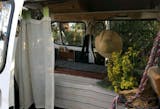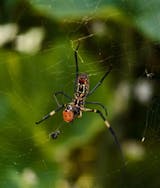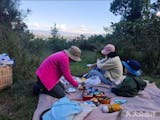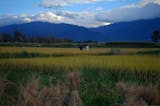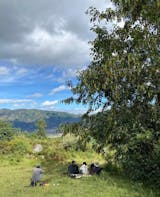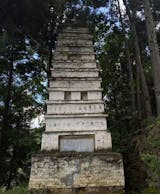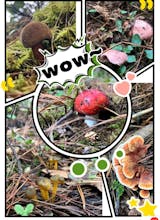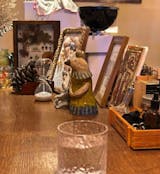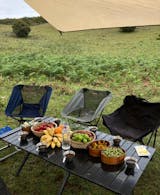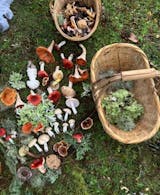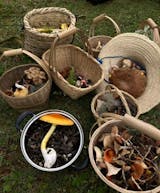
Yang Mo | Living in Dali
1. Dali is a small place.
Compared to the huge size of first- and second-tier cities in China, Dali is a small town in a remote corner. The pace of life in a small town is suitable for me. I don’t need to spend two or three hours commuting every day. In Dali, walking and riding a bike can complete 90% of daily transportation. I don’t need to plan to meet friends a day in advance, because I can meet at the agreed place half an hour after sending a message.
The so-called "small place" means that you can live nearby: you can walk to the market in ten minutes to buy vegetables, you are familiar with every street and alley around you, you know where the well water is sweet and delicious, and you know when the winter cherry blossoms at the intersection will bloom, you know which small shop is at which corner, you often visit it, and you may meet acquaintances. These details of life constitute a picture of life, which is engraved in your mind and creates a sense of security in your heart.
I grew up in a small town like this, and this kind of life scene suits me.
2. Dali is a small place with mobility.
There are thousands of small towns in China, but not many of them are mobile. Every time I go back to my hometown, I always feel that time passes so slowly, nothing has changed, people's lives, the way they look at the world, people's values, have not changed at all. It's like a deep pool of water, a world of its own, but it's not suitable for me now.
Dali is a special place. Not to mention that Dali was once a crossroads of Asian culture during the Nanzhao Kingdom period, Dali is now also a place with frequent population movement. Movement brings vitality, diversity and creativity. There are more than tens of thousands of "new Dali people" living in Dali, and the number of tourists coming and going every day is even more lively.
Dali has its own unique cultural environment, thanks to the backpackers in the 1980s and 1990s. At that time, Dali was still a remote corner that no one cared about, and people's impression of it mostly came from Jin Yong's novels. Before capital and tourists flocked in, foreign backpackers brought hippie culture. Hippie culture is against the mainstream, and being against the mainstream is precisely the soil for freedom, tolerance and diversity.
Therefore, Dali is a multicultural place that is both quiet and bustling, both local and foreign. Some people build a small courtyard here, quietly grow flowers and crops, drink tea and play with cats. Some people come here to do some small business. Some people come here to lie down. Some people cheat and deceive. Some people go up the mountain to cultivate immortality. Young people come in waves, bringing with them their fresh faces, their young gains and losses.
3. Local conditions and climate.
Although the rainy season in Dali was too long this year, the spring-like temperatures all year round and the bright sunshine on sunny days are still the reasons for many people to stay in Dali.
Dali has a subtropical monsoon climate, with an average altitude of 2,000 meters. Affected by the Indian Ocean monsoon, rainfall is concentrated from May to September each year. Dali is a plateau, but it is not short of oxygen. Cangshan is the continuation of the southern section of the Himalayas, with a drop of more than a thousand meters, lush vegetation, large tracts of forests and grasslands, and a rich variety of plants and animals living and breeding.
Dali is an open plain between Cangshan Mountain and Erhai Lake. This openness is not only a landscape, but also has an impact on people's psychology. Sometimes after staying in Dali for a long time, I feel that the scenery here is just ordinary, but every time I go deep into the mountains, every time I go to the Erhai Lake in the evening on a sunny day, the beauty of Dali always surprises me, as if I noticed the mountains, forests and waves here for the first time.
The above are still the reasons why I live in Dali. But beneath all these appearances, there is actually another fundamental reason: Dali is suitable for people who want to build their own life according to their own ideas.
People often ask why they choose to stay in Dali. The implication is that there is nothing here, no resources in big cities, no social connections in hometowns, how can life be sustained? What I want to say is that perhaps it is precisely because of the lack of resources and social connections that life has shown new possibilities. Many people who come to Dali have learned to paint, learn music, learn handcrafts, learn to support themselves with a skill, learn to operate self-media, try to set up stalls for the first time, and try to be a digital nomad and freelancer.
Until now, many people do not understand or even laugh at Dali's culture of lying flat, but I think this just reflects a characteristic of Dali: no matter who you are, you can conduct your life experiment in Dali. Here, someone is doing strange things, which may be a short and experimental rebellion against his own life. From another perspective, those who lie flat in Dali are also people who do not want to be disciplined. And they have made their own choices for their lives.
There are many people living in Dali who actually want to live more seriously. They have thought, hesitated, struggled, and still feel that they need to take on the responsibility of life. The real responsibility of life is not those things in the traditional values of society. On the contrary, the responsibility of life requires you to find the value of life by yourself and weave the web of the meaning of life according to your true wishes.
If life is a drama, in Dali, you have to fill in the blank pages of the script yourself.







